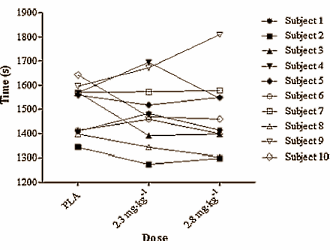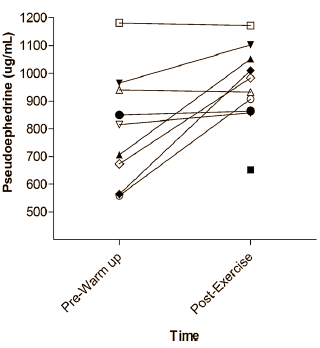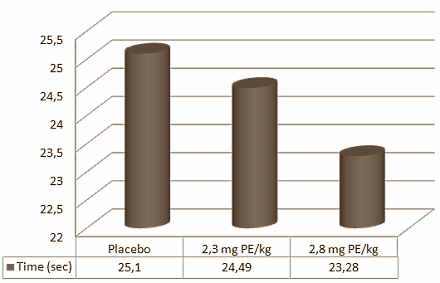|
Definition: "An ergogenic aid is any substance or phenomenon that enhances performance "
|
|
||||||||
23.12.2013 |
|
|
Pseudo-ephedrine unreliable doping agent for cyclists
In 2010 Pritchard-Pescheka wrote in the International Journal of Sport Nutrition and Exercise Metabolism that trained cyclists were 5.1 percent faster on a time trial after taking 2-3 mg pseudo-ephedrine per kg bodyweight 60 minutes before starting. [Int J Sport Nutr Exerc Metab. 2010 Apr;20(2):132-8.] But in a new study that the same researcher is about to publish in the Journal of Science and Medicine in Sport, she concludes that pseudo-ephedrine does not improve cyclists' endurance performance.
In the most recent study 10 experienced cyclists, average age 25, did a time trial on three occasions. On one occasion they were given a placebo 60 minutes before starting, on the other two occasions they were given 2.3 mg or 2.8 mg pseudo-ephedrine per kg bodyweight. The figure below shows that the cyclists' average speed increased after they had taken the substance, which by the way is on the WADA doping list. The effect was not statistically significant, though.
The times of the individual cyclists are shown below. Clear as mud.


The researchers measured the amount of pseudo-ephedrine in the cyclists' blood before and after they did the timed ride. The speed with which the cyclists absorbed the substance varied considerably. The figure above shows the concentration of pseudo-ephedrine after taking the higher dose.
When they looked more carefully at their data, the researchers discovered that the cyclists whose pseudo-ephedrine peak coincided with the timed ride didn't automatically record better times.
"The considerable variation in plasma pseudoephedrine between individuals following ingestion was unexpected and may explain why some studies have shown improvements in performance while others have not", the researchers conclude. "Moreover, peak plasma pseudoephedrine concentrations following pseudoephedrine administration in the present study did not appear to coincide with time trial performance."
More:
|
|



